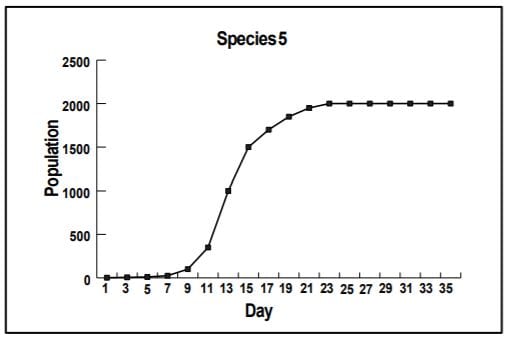What is the difference between passive and active transport?
Active transport require energy.
What is the job of the cell membrane?
To maintain homeostasis by moving materials in and out of the cell.
What is the source of all energy in ecosystems?
The Sun
Lipid
How do the following DNA bases match with RNA bases?
A ->
T ->
C ->
G ->
A -> U
T -> A
C -> G
G -> C
Alcoholic and Lactic Acid Fermentation
What does a cell have to do before mitosis? (2 things)
Grow and replicate DNA

What is the carrying capacity?
2000
 What is the optimal pH and Temperature of this enzyme? (100pts each)
What is the optimal pH and Temperature of this enzyme? (100pts each)
pH: 5.5
Temperature: 48 degrees Celsius
Which organelle is responsible for the assembly of proteins?
Ribosomes
A saltwater plant is placed in freshwater. How will the water molecules move and how will it affect the cell size?
The water will enter the cell and the cell will swell or increase in size.
What are three parts of the cell that both eukaryotic cells and prokaryotic cells have in common?
Ribosomes, cell membrane, and DNA
In a certain ecosystem, rattlesnakes are predators of prairie dogs. If the prairie dog population started to increase, how would the ecosystem most likely regain stability?
The rattlesnake population would increase
What are the three components of a nucleotide? (100pts each)
Sugar, phosphate, and nitrogenous base
During protein synthesis, mRNA leaves the nucleus and travels towards the ribosome to go through what process?
Translation
Name and write the equations for the processes that occur in the mitochondria and chloroplast.
(200 pts each)
Extra 50pts if you explain the relationship between the two equations.
Cellular Respiration (aerobic)
Oxygen + Sugar --> Energy (ATP) + CO2 + Water
Photosynthesis
Water + Energy (solar) + CO2 --> Oxygen + Sugar
The numbers shown represent the number of chromosomes present in the nucleus of each cell at the start and end of the process. This process can be used to illustrate:
A) human tissue repair and growth
B) meiosis
C) genetic recombination
D) sexual reproduction
A) human tissue repair and growth
If the tertiary consumer population gets one unit of energy from the secondary consumer, how many units of energy did the primary consumer get from the producer?
100 units of energy
The end products in this diagram would contain what monomer? (not an example of this monomer)
Monosaccharides
Where does each step of protein synthesis take place?
Translation takes place in the cytoplasm at a ribosome.
Draw and label the 5 stages of mitosis (100pts each)
Whiteboard should include accurate drawings of PMATC

What is the main reason the inner membrane of the mitochondria (shown above) has lots of folds, called cristae?
To increase surface area and maximize ATP production
Which statement is true?
A) Level C contains the largest number of consumers in the pyramid.
B) The organisms in level B obtain food directly from level A
C) Level A contains the largest producers in the pyramid.
D) Level D contains the greatest number of heterotrophs in the pyramid.
A) Level C contains the largest number of consumers in the pyramid.

In this picture, what do each of the circles on the molecule represent? (200pts) What kind of bonds are used to join them together? (300pts)
1. Amino acids
2. Peptide bonds
Why do we call it a frameshift mutation?
Because all of the codons shift after the insertion or deletion of the nitrogenous base